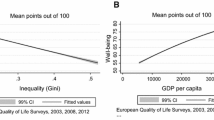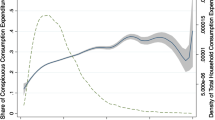Abstract
Which impact does government size have on life satisfaction, and how do effects of bigger government differ between income groups in society? Previous studies typically employed country averages and thus neglected possibly heterogeneous happiness effects between income groups. This paper addresses empirically the effects of government spending on subjective well-being of individuals belonging to different income groups. Our analysis is based on individual data from 25 European countries participating in the European Social Survey. In contrast to most previous studies we take account of the endogeneity between relative income position and reported life satisfaction by an instrumental variable approach. Our results suggest, first, that most government spending categories, including social protection, are on average negatively related to individual well-being. Secondly, estimated marginal effects of health, education and social protection spending at different income levels show that spending increases always have a stronger negative effect on high income groups’ well-being than on low income groups’ life satisfaction. For all government spending categories, marginal happiness effects of higher public spending are clearly negative for income groups at the top.




Similar content being viewed by others
Notes
Notwithstanding the existing differences, the terms "happiness", "life satisfaction" and "subjective well-being" are used interchangeably in the present paper.
Knoll et al. (2013) report evidence for positive effects of low economic regulation on subjective well-being. Paradoxically, people who are ideologically opposed to market-oriented policies sometimes benefit most from deregulation in terms of increased life satisfaction.
Gandelman and Porzecanski (2013) report that income inequality also transforms into happiness inequality, but due to decreasing marginal utility of income happiness inequality is only about half the size of income inequality, as measured by Gini coefficients.
Further income categories are: 2nd category: 1800–3600€; 3rd category: 3600–6000€; 4th category: 6000–12,000€; 5th category: 12,000–18,000€; 6th category: 18,000–24,000€; 7th category: 24,000–30,000€; 8th category: 30,000–36,000€; 9th category: 36,000–60,000€; 10th category: 60,000–90,000€; 11th category: 90,000–120,000€.
We also employed income inequality measures as macro control variables but these never turned out to be statistically significant.
In order to obtain comparable occupation information over all waves, we have recoded the ISCO 88-information into the ISCO 08-scheme according to the correspondence table of the ILO (http://www.ilo.org/public/english/bureau/stat/isco/isco08/index.htm).
We do not report the whole set of control variables, as estimates are highly stable. Of course, results are available on request.
We owe this idea to Justina A. V. Fischer.
References
Berg M, Veenhoven R (2010) Income inequality and happiness in 119 nations. In search for an optimum that does not appear to exist. In: BentGreve (ed) Social policy and happiness in Europe. Cheltenham, pp 174–194
Bjørnskov C (2012) Wellbeing and the size of government. In: Booth P (ed) The pursuit of happiness. IEA, London, pp 160–177
Bjørnskov C, Dreher A, Fischer JAV (2007) The bigger the better? Evidence of the effect of government size on life satisfaction around the world. Public Choice 130:267–292
Bjørnskov C, Dreher A, Fischer JAV (2008) Cross-country determinants of life satisfaction: exploring different determinants across groups in society. Soc Choice Welf 30:119–173
Bowles S, Gintis H (2002) The inheritance of inequality. J Econ Perspect 16:3–30
Clark AE, Oswald AJ (1996) Satisfaction and comparison income. J Public Econ 61:359–381
Clark A, Frijters P, Shields MA (2008) A survey of the income happiness gradient. J Econ Lit 46:95–144
D’Addio AC (2007) Intergenerational transmission of disadvantage: mobility or immobility across generations? OECD Soc Employ Migr Workp 52. doi:10.1787/217730505550
De Neve JE, Oswald AJ (2012) Estimating the influence of life satisfaction and positive affect on later income using sibling fixed effects. Proc Natl Acad of Sci USA 109:19953–19958
Di Tella R, MacCulloch RJ, Oswald AJ (2003) The macroeconomics of happiness. Rev Econ Stat 85:809–827
ESS 1–6, European Social Survey Cumulative File Rounds 1–6
Eurostat, AMECO-Database
Ferrer-i-Carbonell A (2005) Income and well-being: an empirical analysis of the comparison income effect. J Public Econ 89:997–1019
Ferrer-i-Carbonell A, Ramos X (2012) Inequality and happiness: a survey. AIAS GINI discuss Pap 38, Amsterdam
Flavin P, Pacek AC, Radcliff B (2014) Assessing the impact of the size and scope of government on human well-being. Soc Forces 92:1241–1258
Frey BS (2008) Happiness: a revolution in economics. MIT Press, Cambridge
Frijters P, Haisken-DeNew JP, Shields MA (2004) Money does matter! Evidence from increasing real income and life satisfaction in East Germany following reunification. Am Econ Rev 94:730–740
Frijters P, Johnston DW, Shields A (2012) The optimality of tax transfers: what does life satisfaction data tell us? J Happiness Stud 13:821–832
Gandelman N, Porzecanski R (2013) Happiness Inequality: how much is reasonable? Soc Indic Res 110:257–269
Gardner J, Oswald AJ (2007) Money and mental well-being: a longitudinal study of medium-sized lottery wins. J Health Econ 26:49–60
Gemmell N, Au J (2013) Do smaller governments raise the level or growth of output? Rev Recent Evid Rev Econ 64:85–116
Hajdu T, Hajdu G (2014) Reduction of income inequality and subjective well-being in Europe, Econ discuss Pap 2014–22
Helliwell JF, Huang H (2008) How’s your government? International evidence linking good government and well-being. Br J Polit Sci 38:595–619
Hessami Z (2010) The size and composition of government spending in Europe and its impact on well-being. Kyklos 63:346–382
Hoffmann E, Scott M (1993) The revised international standard classification of occupation (ISCO-88), a short presentation. Meeting document. http://www.ilo.org/wcmsp5/groups/public/—dgreports/—stat/documents/meetingdocument/wcms_087943.pdf
Knight J, Song L, Gunatilaka R (2009) Subjective well-being and its determinants in rural China. China Econ Rev 20:635–649
Knoll B, Pitlik H, Rode M (2013) A note on the impact of economic regulation on life satisfaction. Appl Econ Lett 20:916–920
Luttmer EFP (2005) Neighbours as negatives: relative earnings and well-being. Q J Econ 120:963–1002
Lydon R, Chevalier A (2002) Estimates of the effect of wages on job satisfaction. Manuscript, Centre for Economic Performance, London School of Economics
McBride M (2001) Relative-income effects on subjective well-being in the cross-section. J Econ Behav Organ 45:251–278
Meltzer AH, Richard SF (1978) Why government grows (and grows) in a democracy? Public Interest 52:111–118
Meltzer AH, Richard SF (1981) A rational theory of the size of government. J Polit Econ 89:914–927
Moulton BR (1990) An illustration of a pitfall in estimating the effects of aggregate variables on micro units. Rev Econ Stat 72:334–338
Mueller DC (2003) Public choice III, Cambridge
Ott JC (2011) Government and happiness in 130 nations: good governance fosters higher level and more equality of happiness. Soc Indic Res 102:3–22
Powdthavee N (2010) How much does money really matter? Estimating the causal effects of income on happiness. Empir Econ 39:77–92. doi:10.1007/s00181-009-0295-5
Rode M (2013) Do good institutions make citizens happy, or do happy citizens build better institutions? J Happiness Stud 14:1479–1505
Rözer J, Kraaykamp G (2012) Income inequality and subjective well-being: a cross-national study on the conditional effects of individual and national characteristics. Soc Indic Res. doi:10.1007/s11205-012-0124-7
Samuelson PA (1954) The pure theory of public expenditure. Rev Econ Stat 36:387–389
Veenhoven R (2000) Wellbeing in the welfare state. J Comp Policy Anal 2:91–125
Author information
Authors and Affiliations
Corresponding author
Appendix
Appendix
See Tables 7, 8, 9, 10 and 11.
Rights and permissions
About this article
Cite this article
Knoll, B., Pitlik, H. Who benefits from big government? A life satisfaction approach. Empirica 43, 533–557 (2016). https://doi.org/10.1007/s10663-015-9304-4
Published:
Issue Date:
DOI: https://doi.org/10.1007/s10663-015-9304-4
Keywords
- Life satisfaction
- Government size
- Health spending
- Education spending
- Social protection
- Instrumental variables




